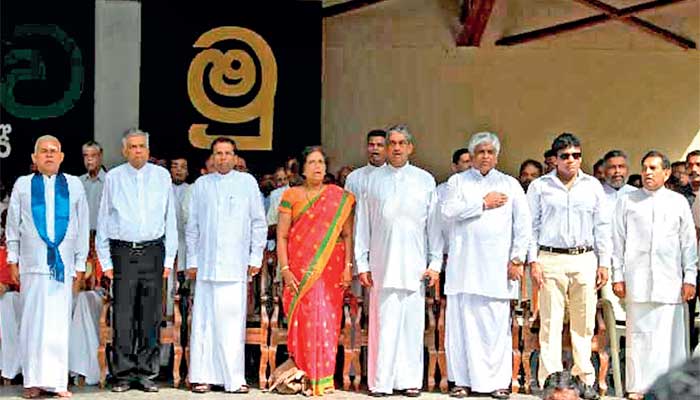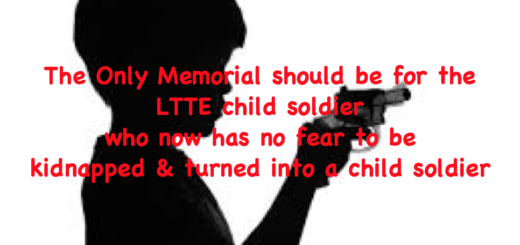The Yahapalana Regime (2015–2019): A Comprehensive Exposé

The Yahapalana government, installed in 2015 after a US–India regime-change operation to remove Mahinda Rajapaksa, promised “good governance,” anti-corruption, and democracy. Instead, it systematically dismantled Sri Lanka’s post-war gains. Between 2015 and 2019, it undermined sovereignty, destabilized the economy, weakened national security, and enabled unprecedented foreign interference. This exposé consolidates the failures, individuals, parties, and institutions responsible.
The Key Actors
- Maithripala Sirisena– President (SLFP)
- Ranil Wickremesinghe– Prime Minister (UNP)
- Chandrika Bandaranaike Kumaratunga – former President (key architect of coalition that toppled Mahinda Rajapakse)
- Mangala Samaraweera– Foreign Minister
- Ravi Karunanayake– Finance Minister
- Arjuna Mahendran– Central Bank Governor (foreign national, handpicked by PM)
- Indrajit Coomaraswamy– Central Bank Governor (2016–2019); advisor to Raj Rajaratnam (Galleon); Pathfinder think-tank/MCC links
- Karu Jayasuriya– Speaker
- M. Jayaratne– Outgoing PM ignored in appointment anomaly
- Anura Kumara Dissanayake (JVP)– Linked to FCID case management
- Ravi Seneviratne– Acting Head, FCID
- Shani Abeysekera– Director, CID
- C. Weliamuna– Headed SriLankan Airlines inquiry team; BASL-linked
- Nimalka Fernando– NGO activist; Yahapalana campaigner; OMP member
- Saliya Pieris– Chairman, Office of Missing Persons
- TNA, SLMC, JVP, BASL leadership, NGO coalitions– Yahapalana’s parliamentary and civil society support base
- Jayantha Jayasuriya– Attorney General, later Chief Justice, signatory to MCC
- Pujith Jayasundera– IGP
- Upul Jayasuriya – BASL President
- Paskaralingam– Senior Advisor to PM; recommended Trimble mapping
- Unity Government & Unlawful PM Appointment
- Ranil Wickremesinghe appointed PM immediately after presidential election with only 40 MPs; sitting PM D. M. Jayaratne had not resigned.
- TNA with only 16 MPs was declared Opposition, violating norms.
- Yahapalana coalition brought together UNP, SLFP defectors, TNA, SLMC, JVP, NGOs, and BASL.
Implications: Precedent for unconstitutional governance; weak, manipulable coalition beholden to external sponsors.
- 19th Amendment & Institutional Capture
- Shifted power from President to PM/Parliament under guise of “democracy.”
- Politicized independent commissions.
- Attempted constitutional overhaul with foreign consultants; proposals aimed at diluting Article 9 (Buddhism).
- Central Bank Bond Scam & Politicized Finance
- Central Bank moved under PM prior to 2015 bond scam.
- Arjuna Mahendran, foreign national, made Governor.
- 110 billion loss via irregular bonds.
- Successor Indrajit Coomaraswamy had conflict of interest (Rajaratnam, Pathfinder).
Implications: Credibility of financial governance destroyed; investor confidence shattered.
- High-Risk Borrowing & Debt Entrapment
- Yahapalana floated $12.5 billion ISBs at high interest, bought by hedge funds.
- Debt burden passed to future governments, laying foundation for economic collapse.
- Mismanagement of Assets & Vanity Projects
- Port Cityhalted; $130m compensation; additional land ceded to China.
- Hambantota/Mattala tenderscancelled; penalties imposed.
- East Container Terminalmachinery cancelled → 55b loss.
- Symbolic extravagance: Arjuna Ranatunga’s “world’s ugliest” Christmas tree at Galle Face.
- MCC & Land Sovereignty Undermined
- MCC compact ($480m) tied to land/transport reforms.
- 28% of Sri Lanka’s land to be digitized, with foreign contractors enjoying immunity.
- Signed by AG Jayantha Jayasuriya without Parliament’s sanction.
- Trimble Mapping & Survey Dept Sidelined
- Paskaralingam’s committee bypassed Survey Department.
- Cadastral mapping contract given to US firm Trimble at$154m (vs $40m local estimate).
- Land, cadastral data, and geospatial sovereignty compromised.
- UNHRC Co-Sponsorship & Geneva Agenda
- Yahapalana co-sponsored Resolution 30/1 (Oct 2015).
- Committed to: OMP, Office for Reparations, hybrid courts, constitutional changes.
- Legitimized LTTE victimhood narrative and external monitoring of Sri Lanka.
- National Security Eroded
- Intelligence officers arrested/sidelined.
- Units tracking Islamist extremism shut down.
- Military demonized internationally.
- Result:Easter Sunday 2019 attacks, preventable if intelligence had not been dismantled.
- Corruption, Nepotism & Weaponized Justice
- FCID selectively targeted opposition; Yahapalana corruption ignored.
- Weliamuna Report on SriLankan Airlines: 136 pages, 11 chapters, cost Rs. 3.5m—widely criticized as superficial, politically motivated.
- Appointments based on loyalty/family ties.
- Yahapalana vs Maha Sangha
- Monks opposing MCC, Geneva resolutions, and constitutional reforms branded “racist extremists.”
- Attempts to weaken Buddhism’s constitutional protection.
- Protests and objections by the Sangha disregarded.
- Public Unrest & Declining Services
- Strikes by doctors (SAITM), teachers, and railway workers crippled governance.
- Health and education underfunded and politicized.
- Agriculture, energy, transport, and industry neglected.
- Industrialization stalled; foreign investors withdrew.
- Foreign Influence Entrenched
- US: Geneva agenda, MCC, NGO networks.
- India: Trimble mapping, land agenda, security role.
- China: Hambantota lease painted as “debt trap” though Yahapalana mismanagement created dependency.
Additions:
- Salawa Military Camp Explosion (2016): The fire and ammunition explosion devastated surrounding villages, displaced thousands, and destroyed civilian property. Yahapalana’s weak oversight and negligence were heavily criticized.
-
Meethotamulla Garbage Dump Collapse (2017): Years of neglect and politicized mismanagement led to the garbage mountain collapsing on residents, killing over 30 people and destroying homes. No accountability was enforced.
-
Lotus Tower Project Interruption: Originally planned and funded under the Rajapaksa administration, the project stalled under Yahapalana, with contracts disrupted, funds mismanaged, and work delayed. What should have been a landmark symbol of progress became another story of inefficiency.
The Damage Summarized
- Legal/Political: Unconstitutional PM appointment, 19th Amendment abuses.
- Economic: Bond scam, ISB borrowing, asset mismanagement, Port City fiasco.
- Security: Intelligence dismantled, Easter Sunday attacks.
- Sovereignty: MCC, Trimble, Geneva concessions.
- Governance: Nepotism, weaponized FCID, NGO infiltration.
- Society/Religion: Health, education, agriculture weakened; Maha Sangha targeted.
A Wake-Up Call
The Yahapalana years (2015–2019) stand out as the most destructive governance period in post-war Sri Lanka. They inherited a nation free of terrorism, with infrastructure in place and the opportunity to deliver the “good governance” they promised. Instead, they delivered corruption, economic sabotage, and the erosion of sovereignty.
Those who enabled this betrayal — political parties, NGOs, BASL figures, and individuals within the system — must be held accountable for undoing the progress Sri Lanka had achieved between 2009 and 2015.
Shenali D Waduge







